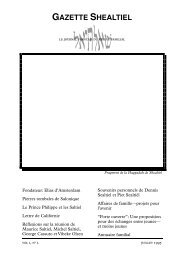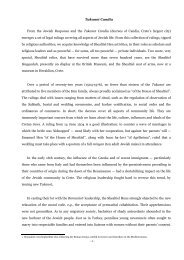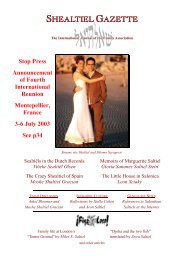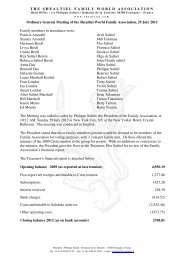Gazette Vol 1 No 4 - The Shealtiel Family Worldwide
Gazette Vol 1 No 4 - The Shealtiel Family Worldwide
Gazette Vol 1 No 4 - The Shealtiel Family Worldwide
Create successful ePaper yourself
Turn your PDF publications into a flip-book with our unique Google optimized e-Paper software.
december 1995 SHEALTIEL GAZETTE vol i no iv<br />
atrocities of their own side.<br />
Determined not to become the fifth victim of a<br />
“retaliation”, Emanuel obtained an overcoat<br />
from the officers’sleeping quarters, disguised<br />
himself with a “huge moustache” and walked<br />
out through the outer door of the prison. He<br />
went to a house of a “wellknown banker” in<br />
the city and obtained the uniform and false<br />
documents of a confederate enlisted man from<br />
Georgia by the name of Joseph Isaacs. He then<br />
retraced his steps to the prison, still wearing<br />
the top coat of a union officer and simply returned<br />
the coat, burned the “huge moustache”<br />
and joined the group of Georgia prisoners<br />
awaiting transportation to Camp Douglas' Illinois.<br />
Thus Joseph Isaacs came into being.<br />
”<br />
Emanuel saltiel, now<br />
known as the enlisted<br />
man Joseph Isaacs, was<br />
assigned to Company H<br />
under the command of<br />
Captain Charles W Ferrers, a sickly and incompetent<br />
officer. Isaacs was soon promoted<br />
to the rank of First Sergeant and it was clear<br />
that he was aiming for a career in the military.<br />
Company H arrived for duty at Camp Rankin,<br />
in the Colorado Territory. Also stationed there<br />
was Company I under the command of Captain<br />
John T Shanks who was to play an important<br />
role in Emanuel's military career.<br />
It is clear that even though the need for manpower<br />
in the Indian territory was great, the<br />
War Department failed to provide adequate<br />
leadership for the former confederates on the<br />
frontier. Long, monotonous hours, bad food<br />
and crude shelter combined with late payment<br />
and an inhospitable environment to debilitating<br />
effect on the western soldiery. Reports of<br />
military inspections show that discipline in the<br />
Colorado Territory was “nonexistent”.<br />
<strong>The</strong> desertion rate was up to thirty percent,<br />
and many commanding officers were corrupt.<br />
<strong>The</strong> only efforts by the Western High Command<br />
to maintain discipline was the use of the<br />
Court Martial. <strong>The</strong> issues at the root of problems<br />
were not treated and the Courts themselves<br />
provided no justice to the accused. Guilt<br />
was generally presumed over innocence.<br />
”<br />
<strong>No</strong>t unlike the scenes we used to see in the<br />
“Emanuel was determined<br />
not to become a victim of<br />
Yankee retaliation.”<br />
Westerns, frontier military units were occasionally<br />
expected to provide escorts for civilian<br />
wagon trains, and it was customary for the<br />
wagon masters to pay nominal sums of money<br />
to the enlisted man for their services. <strong>The</strong> arrival<br />
of one such wagon train on June 1865 set<br />
the stage for the event that brought to light the<br />
corruption of the legal system in the military<br />
and changed the life of Joseph Isaac, our<br />
cousin Emanuel Saltiel.<br />
Leander black, the wagon master, agreed<br />
to pay one dollar per day to each enlisted man<br />
of companies H and I who made the round<br />
trip with his train between Rankin and Fort<br />
Laramie. <strong>The</strong> commanders of the two companies<br />
seized the money Black was to pay to the<br />
enlisted men at gun point. <strong>The</strong> troopers<br />
threatened violence;<br />
Black vigorously objected<br />
to the action and Isaacs<br />
now acted in a manner<br />
gaining him two mortal<br />
enemies.<br />
Capt. Ferrers, the commander<br />
of Company H, was “lying in a beastly<br />
state of intoxication, and the men were in a<br />
perfect state of mutiny”. 4 Isaacs temporary assumed<br />
the command of his company. He reprimanded<br />
the man for their “disrespect”, but<br />
nevertheless promised that he would recover<br />
their money. Isaac’s assertive behaviour further<br />
strained relations between Ferrers and<br />
Isaacs, which had been uneasy from the start.<br />
Isaacs had formerly complained that his superior<br />
officer falsified treasury and ordinance reports<br />
to which Ferrers retorted that “rank was<br />
of no advantage unless the person holding it<br />
could benefit by that”. It seems that Isaacs had<br />
sealed his fate with his success in preventing<br />
desertions on an earlier occasion when Ferrers<br />
was absent. His superior officer concluded,<br />
and rightfully so, that Isaacs' mounting influence<br />
in the company was a threat to his own<br />
position and he decided that a “confrontation<br />
with his antagonist was mandatory”. 5<br />
Ferrers and shanks, the commander of<br />
company I and his partner in corruption, had<br />
their opportunity to rid themselves of Isaacs<br />
during a sand storm the afternoon of August<br />
12. <strong>The</strong> company was on a new mission to<br />
protect the telegraph line between Fort Casper<br />
and South Pass. Isaacs noticed that the ropes<br />
4 Saltiel’s military file.<br />
5 Saltiel’s testimony in his court marital<br />
page seven








